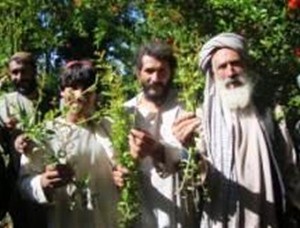
Farmers show pomegranate boughs cleaned of aphids as a result of the USAID/AVIPA Plus Integrated Pest Management program. The program trained workers to spray an ecologically friendly solution made from locally available materials on the lush orchards of
IRD/AVIPA Plus
AVIPA’s orchard management project in Kandahar draws people back to their homes and peaceful livelihoods.
5 MAY 2010 | KANDAHAR, AFGHANISTAN
Forty thousand hectares of land in Kandahar are covered with dark green fruit and nut tree orchards, a vivid contrast to the candescent sand dunes and ashen gravel plains in other parts of the province. These trees date back to pre-Soviet times, when Afghanistan contributed 65 percent of the world’s dried fruit and nut exports. Over the decades of war in this area, however, many of the trees were burnt down or cut for fuel. Today, many of the remaining trees have grown old, while the knowledge of tree care, handed down from one generation to the next, has grown old too, or vanished altogether.
These days, attending to one’s fruit trees is a risk. The Taliban often use the orchards as hideouts and shelters for setting up ambushes. Farmers, nevertheless, take this risk willingly and have even accepted the assistance of the USAID-funded Afghanistan Vouchers for Increased Production in Agriculture Plus (AVIPA Plus) program to improve their traditional source of income.
In early 2010, AVIPA Plus funded the pruning and cleaning of more than 6,600 hectares of existing orchards in Arghandab, the most prolific pomegranate-producing area in Kandahar. Selected by village shuras, 12,000 local farmers were trained in proper cleaning and pruning methods, which are now being used in the village orchards.
Listening to the needs of the communities, and in collaboration with the Afghan Government, the program initiated a massive three-week tree planting project leading up to the Afghan New Year on March 21. More than 600,000 pomegranate, plum, and apricot saplings and 200,000 grape vines were planted on the same 6,600 hectares of previously cleaned and pruned orchards to replace old trees and to increase the density of the orchards. Another 200 hectares of new vineyards will be planted with 200,000 vine cuttings in May. In addition, to counter an aphid infestation, the program designed and is implementing an eco-friendly pest management program offering training, wages, equipment, and supplies to more than 7,300 workers to date.
Khudai Nazar, an orchard owner from the village of Ali Kallev, has four hectares of pomegranates, apricots, and plums. He participated in all three segments of the orchard management project: pruning, sapling transplantation, and spraying. He has noticed that his fruit is a third larger than usual and he believes this year’s harvest will be bountiful. Having lived all his life in a war-torn area, he sees both the proverbial forest, or rather orchard, and the trees: “We have a good relationship with our government now, since people have jobs through AVIPA’s assistance, instead of joining the insurgency.”
In Afghanistan, the work of peace is similar to nurturing a tree. It is a process that takes time, and it must have good roots, good seed, and the hand of an honest farmer to plant it and care for it.







Comment
Make a general inquiry or suggest an improvement.